|
After the film was over, Jan Merlin came to the front of the room give a brief talk. Questions in bold were thrown out by members of the audience.
Jan began by speaking of Hal R. Makelim. This was the first film Makelim produced.
|
"He did the best he could with this film. As you can see he had some real fine actors in it. Robert Armstrong...I was still green enough in Hollywood so that when I saw Robert Armstrong on the set I was in awe of him. This is the guy who was in King Kong, that I?d seen as a kid, I thought he was really a marvel.
James Mitchell,who played the parson, was a Broadway musical star, dancer and actor...he came out to Hollywood to do film acting. I think he did a darn good job in the picture. [James Mitchell may be best known to today's audiences as Palmer Cortlandt in the soap opera All My Children.]
Rosemarie Bowe was later married to Bob Stack. Stack would come around and watch us rehearse. [Robert Stack is most famous for the role of Elliott Ness in The Untouchables. Rosemarie Bowe was married to Stack from 1956 until his death in 2003. She acted in only a few movies and briefly in television.]
|
The Peacemaker
Cast
James Mitchell
Rosemarie Bowe
Jan Merlin
Jess Barker
Hugh Sanders
Herbert Patterson
Dorothy Patrick
Taylor Holmes
Robert Armstrong
Philip Tonge
David McMahon
Wheaton Chambers
Jack Holland
Nancy Evans
Harry Shannon |
-Terrall Butler
-Ann Davis
-Viggo Tomlin
-Ed Halcomb
-Lathe Sawyer
-Gray Arnett
-Edith Sawyer
-Mr. Wren
-Sheriff Ben Seale
-Elijah Maddox
-Sam Davis
-Doc Runyan
-Walt Kemper
-Miss Smith
-Cowpuncher |
Based on the novel by Richard Poole.
Screenplay by Hal Richards and Jay Ingram
|
That little town didn?t exist. They had two stages down at the Hal Roach Studios, and they?d opened the ends of ?em so the two of them were one huge stage. They built the town in that stage, brought in dirt for the horses to ride on, and lit it all for daylight or night, whichever. It was a pleasure to work there, ya know. Here I was in the Hal Roach Studios, for heaven's sake - when you went in to work there you passed a swimming pool and on the side of the building next to it was a bronze plaque that said it was dedicated to Laurel and Hardy, who did most of their water jokes in that thing. Later on - not much later on - they paved it over and made a parking lot out of it for the studio. I was kind of upset with that.
Jan's movies
Six Bridges to Cross (1955)
Big House, U.S.A. (1955)
Illegal (1955)
Running Wild (1955)
A Day of Fury (1956)
Screaming Eagles (1956)
A Strange Adventure (1956)
The Peacemaker (1956)
Woman and the Hunter (1957)
Cole Younger, Gunfighter (1958)
Hell Bent for Leather (1960)
The List of Adrian Messenger (1963)
Gunfight at Comanche Creek (1963)
The St. Valentine's Day Massacre (1967)
Strategy of Terror (1969)
Take the Money and Run (1969)
The Twilight People (1973)
The Slams (1973)
I Escaped from Devil's Island (1973)
The Hindenburg (1975)
Permanent Record (1988)
Nowhere to Run (1989)
Silk 2 (1989)
Time Trackers (1989)
For Jan's television work, see the
Internet Movie Database. |
Extras
If you really think about it, the Westerns have changed so much since those times. If you watched those extras, we still had extras who acted as background. Today you have extras who shuffle around...they?re just waiting for lunch. They?re not doing any acting. If they do, it?s pretty rare to see. It?s because they?ve been ordered without any...big shouts-do this, do that. You didn't have to
get these people to act then... they knew how to work as extras in film. They were old professionals, and that?s what they did for a living. They were wonderful to work with.
Ted Post
Ted Post, who directed the picture, made his mark, because he?d been working with Dick Boone in Medic. And he was a television director. Poor Ted, this was his very first movie. And we had some problems with him, because the poor guy was shooting as if he was shooting for television. He headed right into the scene, he wanted you to see the faces and all, as if you were going to be looking at a little, tiny screen. But we were being shown in theaters.
The time when the preacher walked out with the dead man that I?d shot, and he carried him out in his arms... Well, Ted framed the shot so that you saw the dead man in his arms while the preacher?s talking, but the dead man?s breathing. I don?t know whether you caught that |
or not. He sometimes..he?d get confused about what to do and the lighting men up above would call down and give him a suggestion. And I was getting angrier and angrier and of course it showed within the character, who was supposed to be kind of an angry fella. Every once in a while you?d see me - the eyes were blazing because I was angry with Ted at some dumb thing he might have done. But Ted was a good director, he wound up doing a lot of good work. But that was his beginning as a film director.

|
Bad Guy Times
I was deep into my bad guy times. I played ten years of being everybody?s bad cowboy, ten years of being everybody?s gangster, ten years of everybody?s Nazi or middle-European or Russian...
What was there about you that caused that?
I looked good horizontal, ya? know. They once in a while gave me a chance to be a good fella. I was a nice fella in a film called Screaming Eagles, about the drop in Normandy. That was with Tom Tryon.
|
|
Tom and I were hired for the picture...He was supposed to play the good fella...lieutenant or whatever it was, and I was supposed to play the bad guy, the bad soldier. And during the course of the picture the bad soldier would carry the lieutenant around because the lieutenant got blinded after they landed...he got hit in the face. And the producers looked at us and Tom was about this much taller than me, and he was going to be the good guy, and I was going to carry him around through the picture? That wouldn?t work. So the producers kind of said, ?Look, fellas, would you mind if we changed parts??
We looked at each other and laughed because he always wanted to play a bad guy and I always wanted to play a good guy. He said, ?Sure, fine.? We didn?t even have to change the contracts. That?s the way we did that picture. Tom was a nice fella to work with. He was a good man.
|
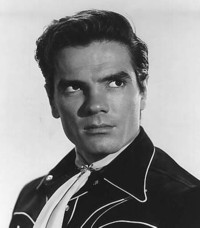
Tom Tryon |
I had a wonderful time in those days. I loved playing the bad guy because he?s the engine of the show. He causes - that?s why the picture?s made. It?s about the troubles he?s started or got into or whatever...and I didn?t care about riding off in the sunset with the girl, I wanted to get in there and have a lot of fun. You enjoy yourself being rotten...it?s a wonderful way to make a living.
Westerns were probably a lot more fun than a gangster movie.
Well, yeah. I loved Westerns mostly because you could get dusty and they weren?t forever at you with a powder puff and making you look pretty. You could get as grungy as you wanted, especially being the heavy. A lot of times I?d be playing the grungy heavy and I?m better looking than the hero was. I think because of all the grungy stuff, you know, it was more interesting.
Those movies - when you had to drink a whiskey, what were you drinking?
Generally tea, sometimes Coca Cola. Generally it was tea...all about the same color..
The blood was...sometimes it was a mixture they made up in the makeup department, but it had a tendency to stain the clothes permanently. I had a nice jacket I once wore, it was my own... They stained it forever, I was sorry I?d let ?em use it. But sometimes they?d use chocolate syrup when it was a black-and-white film. Then when we went to color why they had to use color, so they tried ketchup for a while, they were better off to have the makeup department mix up the stuff.
How long to shoot a picture like this?
This picture? I think we did it in about seven or ten days. The outdoor scenes were shot in Chatsworth, I believe, but all of that town stuff was done inside those ...great big stages put together.
And that was done just because it was cheaper to do it that way? They could control the lighting?
It was ...yeah, I guess it might have been cheaper, because you didn?t have to pay for transportation somewhere, lugging all that equipment back and forth, lugging the actors and extras back and forth, having food trucks sent out. You cut a lot of money that way.
After the picture was done Hal Mikelim bought himself a combination restaurant and bowling alley. I?ve forgotten where it was, but I did go to see him there. He was going to convert it into a studio, a film stage, and he was going to shoot pictures in it. I went out to see him because he was interested in having me do some more pictures for him.
But it just never worked out, because when they released this picture, the time had passed for the kind of....that?s a real old time Western. That?s not the kind of Westerns you have today. There was no psychoanalyzing, there were no dirty words in it. You didn?t see too much blood at all. And people were just genuine moral people. And we don?t make pictures like that anymore. And when the picture came out they were already exposed to a different kind of Western. They wanted blood and gore. They wanted something different...so his dream didn?t work out.
I guess he wound up just running the restaurant and bowling alley - I lost track of him, never saw him again.
Back to Robert Armstrong
I always was sorry that I didn?t go up to talk to the fellow who?d been in King Kong. I was just in awe of him...I couldn?t go up and say, ?Gee, I saw that movie. I thought you were wonderful in it and I?m so proud to be in the picture with you.? I never got to say it.
...It was magic for me to get to Hollywood.
How did that happen?
I?d been doing...when I got out of the Navy nobody needed torpedomen so I was looking for something to do...I got into summer stock theater by accident. I was very handy, I was able to paint and draw, I was a pretty good carpenter. I got me a job building sets for a summer theater, and in the course of that summer I watched those actors and I thought, ?I could do that,? and I?d been told about a school called the Neighborhood Playhouse School of the Theater. I went around to see them...and the fella there, who was a big time teacher, named Sanford Meisner. I didn?t know it at the time, I was raw out of the Navy, for heaven?s sake, I still had a chip on my shoulder, and he was supposed to be practically Godlike in the theater school business, he was supposed to be the best teacher around.
He wanted to know why I wanted to be an actor and I...I had no answer. I said, ?I don?t know.? But nevertheless he accepted me. To my surprise we had people like...Dick Boone was studying there, Eli Wallach, Marion Seldes, she?s a big Broadway star now...a lot of good types came out of there.
SaveCancelCloseDick and I were living off of our fifty-two/twenty club. You got $20 dollars for 52 weeks from the government while you were going to school, and we?d do anything to make some money.
| One of the little teachers at the school had a modern dance company, she worked with Martha Graham. Martha taught us to dance. This little lady asked Dick and I whether we?d like to be in her dance company. She was going to do something for the Young Women?s Jewish Association, and we said sure, we were going to get paid twenty-three dollars per performance.
We joined her company, and we worked with her, rehearsing with her for about a month or so, and kind of crazy numbers and dances and funny costumes. Dick had a kind of toga drag that he wore. He had lines to say that he did with great elocution and gestures...and...it was... well, let?s face it...we got panned by Dance magazine. |

Martha Graham |
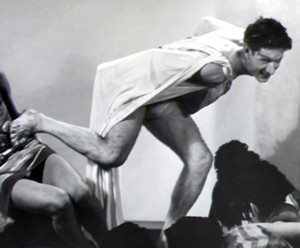
Richard Boone kicking Jan Merlin in the ribs
(Click for enlarged, entire photo)
Photo courtesy Jan Merlin |
I ran into Dick Boone?s son, Peter about two years ago. I?d never met him...young fella, and I got to talking with him. He never knew that his father had once been a dancer. I said, ?wait.? The next time I saw him I had a photograph of his father in the dance pose with the bunch of us. He?s busy kicking me in the ribs and I?m on the floor with the other people, and I also gave him a copy of the Dance review. He was astounded, he just couldn?t believe it. But it wouldn?t have been something that Dick would brag about. But we did it for the 23 bucks. We were grateful. We didn?t keep it up, though, she had to replace us. |
Dick and I were...we were fresh out of service, we didn?t take much guff from this teacher who was supposed to be the greatest thing in show business. We were there and we thought it was lovely to be there with these young girls who wanted to be actresses and they were simply delightful. They were college age girls, came from wealthy families and beautiful to look at, it was a grand time to be in school.
You asked how I got out to Hollywood. I was down to my last 15 cents after I?d finished the schooling, and I?d tried auditioning for shows and hadn?t gotten anywhere. They called me from the school and said that Joshua Logan, who had just directed the biggest hit in town, Mr. Roberts, was casting a new show, and they were looking for military types, and they figured I might go down and try out for it.
| I went down to the theater and fifteen million actors were there waiting to be seen. We went in small groups, progressively smaller groups. They?d say, ?Well, you guys stay and you guys go.? And finally I was in a group of four. The stage was dark, and they were silent out there for a while, and then we heard them say, ?Well, take off your shirts, boys.? So we took off our shirts to show what are physiques looked like, and there was again silence, and then the fellow came walking up to the apron of the stage and it was Josh Logan. He looked up at me and he said. ?I?ve got a young fellow leaving the cast of Mr. Roberts. Which show would you like to be in, Mr. Roberts or South Pacific??
|
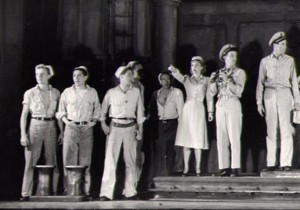
Jan Merlin far left, Henry Fonda far right, Mr. Roberts.
(Click for enlarged, entire photo)
Photo courtesy Jan Merlin |
And I was stunned, and I said, ?Mr Roberts, because I can?t sing.?
He said, ?Have you seen it?? I said ?no.?
He said, ?You?ll see it tonight, and you?ll rehearse tomorrow.? The next day was Saturday. ?Rehearse tomorrow with the stage manager, and you?ll go on tomorrow night.? And that was my first show, a Broadway show. I stayed with that for two years. After two years.. the cast asked for a raise. The producers all said, ?Well, gee fellas, we?d love to have money put by for a rainy day, but we just can?t see it." From that day on everybody in the cast began looking for another job.
Tom Corbett, Space Cadet
| I heard about some kind of space show they were going to be shooting for television. I went over to see them. I guess I must have been about the first one they saw. I was the first one cast, and then they had me remain and read with other actors and they cast finally the other two fellows who were going to be the permanent people, Frankie Thomas, one of ?em.
I stayed with that show for only three years. I just couldn?t take it. I...just didn?t want to be a space cadet. They began to show cartoons in the Sunday papers of Tom Corbett, Space Cadet, and I thought, ?I don?t want to end up being like the fellas who played Tarzan or Dick Tracy, that?s all they ever played,? so I left the show, and I took my wife I had then, who has since died, I took her off to Africa for a while, came back. They asked me to come back to the show and I wasn?t getting any offers from anybody else, so I went back to the show for a short time again, but I knew I shouldn?t stay, so I quit again, permanently. |
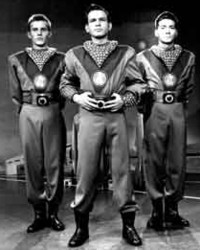
Jan Merlin as Roger Manning, Frankie Thomas as Tom Corbett, Al Markim as Astro |
Edit FileI did an off-Broadway show, Rope, and somebody from Universal saw me, they cast me into Six Bridges to Cross, which was shooting...was going to shoot, in Boston. And I went to Boston, and while I was there, I was playing a kid of about 15 in that, I was actually much older, I was about 26, and after the day?s shooting I?d go off in the bar with the rest of the fellas and get a drink, and the rest of the kids who were in the show would go back to the hotel with their mommies, and the director looked at me and said, ?How old are you?? and I said, ?Well, I?m 26.? He says, ?Well, you could play yorself as the older part,? and I said ?Of course.? He said, ?You?re going to Hollywood.?
I came out to Hollywood, and I never left. After I got to Hollywood I never stopped working. It was a good move to have made. And that?s how I got to Hollywood.
Do you do anything anymore, at all?
No, I write books now. I write some film books, I write about films, but mostly I write novels. They?re all based on people I know, places I?ve been. If I write about Africa every word of it is based on what I?ve really seen and its described in its entirety. The languages of the countries I?ve been in are in the books. If I?m writing about the Philippines you get Tagalog, their Philipino language. If I write about Africa you get Arabic, Bantu, all the other...Swahili. I love doing books like that.
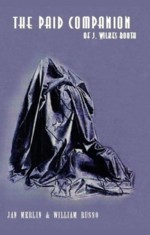
Jan designs the covers for his books |
One of my recent books, which is a favorite of mine, was a book about the Lincoln assassination. I wrote it from the point of view of the young Rebel soldier who was hung for being one of the conspirators. But it?s written from his point of view, and therefore you never read about the actual assassination, because we?ve all read about that a thousand times.
But writing it this way you?ve got a totally different aspect. Because its told entirely through the Confederate?s point of view, and how he got involved with J. Wilkes Booth and how he came to his sad end. I like that book, a lot.
When finished, click Save or Cancel We got a letter from the great-great-great grandson of one of that boy?s sisters. They still lived in Florida. And he wanted a copy of the book. And he got it. And he let us know that the head of the Confederate boy-Payne he was called-was removed after the hanging. In those days they?d study the criminal head and brain and what not. And it was in a jar at the Smithsonian, and it was off in some closet somewhere. |
below. Change PermissionsReadWriteExecuteUserGroupOther A couple of years ago the Smithsonian was cleaning out closets, they came across the head, and they contacted the family in Florida-and they had a family burial plot there, where the boy?s body was buried after he was hung. And they returned the head, so the family could put it in the family plot.
I wish I had known that because ...it would have been a wonderful tag in the book, but instead I tagged the book with what the defense attorney had to say about him, because the papers at the time, and everything you read about him, describe this monster of a person, this killer, this real awful person, which he was not. That he was illiterate, which he was not. He was the son of a Baptist minister. The family owned slaves, they moved to Florida from Alabama. He was well-educated. He was nice enough, and charming enough so that when he was a captive, having been wounded, and he was a captive of the Union Army, they allowed him to help tend the wounded. And when he was eventually put in prison his guards found him so charming and delightful, they really, really really liked him, and the picture of him, you would swear it was taken of some young kid today, who could have been in the movies.
It was extraordinary to reach back into time, which I love doing, I did that with the African books. You get back into that era, and you really live in that era, so when you?re writing it, to be called at the end of the day to come to dinner, or get disturbed, it?s like...suddenly being pulled out of a totally different period of time and brought back to life and everything looks strange because you?re living within the era.
That?s the fun of being an actor and writing a book. Both fields marry each other in the work. You can get inside your characters? heads in a different way. You can write them emotionally rather than just descriptively.
I called the book The Paid Companion of J. Wilkes Booth, which pretty much lets you know what it was about.
When you?re writing your books do you see yourself as an actor inside them, or you?re strictly...?
| I become them. I become them. If I?m writing from their point of view I become them. Which, is peculiar to say, but that?s what I mean about getting into the emotional parts of them, it?s the only way I can reach them, I have to find out why they would think or say or do whatever they do, I have to find the thing that creates those characters. It?s the same thing you do when you?re acting... When you?re playing a heavy you?re not playing a heavy, you?re playing a guy who thinks he?s right. You?re playing a guy who thinks, ?Hey, I?m somebody. I?m pretty good. That?s why they?re so arrogant. They?re so...everybody finds them so vicious, because they?re enjoying it, they?re enjoying their lives.
But today the tendency is to show you these psychotics who hate themselves and they hate the way they live. They wouldn?t stand a chance of robbing a bank because everybody?d say, "Out. You?re cuckoo." |
 |
|


















